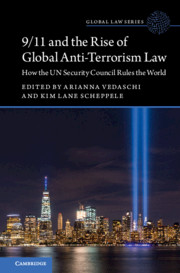Book contents
- 9/11 and the Rise of Global Anti-Terrorism Law
- Global Law Series
- 9/11 and the Rise of Global Anti-Terrorism Law
- Copyright page
- Contents
- Contributors
- Foreword
- Introduction
- Part I The Globalization of Anti-Terrorism Law: Theoretical Frameworks
- 1 A Proposal for a Kantian Definition of Terrorism
- 2 The Ever-Expanding Legislative Supremacy of the Security Council in Counterterrorism
- 3 Common Template, Diverse Agendas
- 4 Citizenship Deprivation and Cosmopolitanism
- 5 The Multilevel Governance of Emergency in Counterterrorism
- Part II Connecting the Global and the Local in Fighting Terrorism: Applications
- Appendix: The UN Security Council and the Rule of Law: The Role of the Security Council in Strengthening a Rules-Based International System
- Index
1 - A Proposal for a Kantian Definition of Terrorism
Leading the World Requires Cosmopolitan Ethos
from Part I - The Globalization of Anti-Terrorism Law: Theoretical Frameworks
Published online by Cambridge University Press: 01 July 2021
- 9/11 and the Rise of Global Anti-Terrorism Law
- Global Law Series
- 9/11 and the Rise of Global Anti-Terrorism Law
- Copyright page
- Contents
- Contributors
- Foreword
- Introduction
- Part I The Globalization of Anti-Terrorism Law: Theoretical Frameworks
- 1 A Proposal for a Kantian Definition of Terrorism
- 2 The Ever-Expanding Legislative Supremacy of the Security Council in Counterterrorism
- 3 Common Template, Diverse Agendas
- 4 Citizenship Deprivation and Cosmopolitanism
- 5 The Multilevel Governance of Emergency in Counterterrorism
- Part II Connecting the Global and the Local in Fighting Terrorism: Applications
- Appendix: The UN Security Council and the Rule of Law: The Role of the Security Council in Strengthening a Rules-Based International System
- Index
Summary
This chapter builds upon three streams of experience by its author: (a) one related to his six-year term as the first UN Special Rapporteur on human rights and counterterrorism (2005-2011), namely the identification of the absence of a proper international definition of terrorism as an important source of human rights abuses, (b) his observation of actual court practice and media coverage where definitional-conceptual elements of terrorism, in particular as to its aims, appear to be ignored despite being one of the cornerstones on which those legal definitions were built, and (c) his academic work pointing out that the instrumentalization of the human person, in breach of Immanuel Kant’s categorical imperative, comes through as a characteristic both of acts of terrorism and of human rights violations committed by States in the name of countering terrorism.
On the basis of reflecting on these experiences, and departing from his own best practice definition built on Security Council Resolution 1566 (2004) and included in his last report to the UN Human Rights Council, the author now proposes the removal of any subjective aim element from international definitions of terrorism, and its replacement with the objective element of the act amounting to the instrumentalization of human beings, typically victims of terrorism.
Keywords
- Type
- Chapter
- Information
- 9/11 and the Rise of Global Anti-Terrorism LawHow the UN Security Council Rules the World, pp. 15 - 33Publisher: Cambridge University PressPrint publication year: 2021

